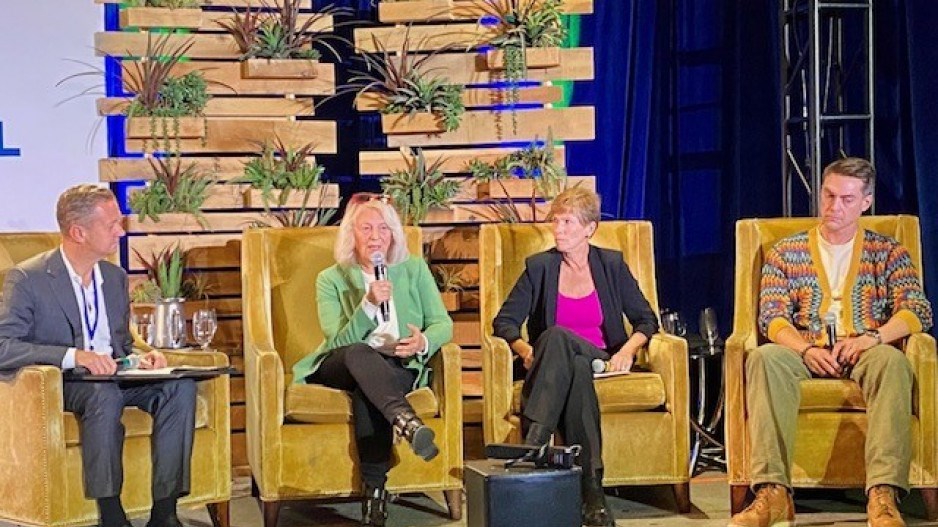B.C. has a rich technology startup eco-system, tech talent and ideal location as a gateway to Asia, but it “sucks” when it comes to BERD (business expenditure in research and development).
And Canadian businesses that don’t seize the opportunities that things like generative AI pose will get left in the dust, the way Amazon left Sears in the dust.
That was among the threats to productivity identified at a panel session on B.C.'s innovation economy at a Business Council of BC (BCBC) business summit Thursday.
“B.C. has been lagging both Canadian and OECD averages,” said Walter Pela, regional managing partner for KPMG, who moderated Thursday’s panel. “B.C. businesses just spend less on R&D compared to national and global counterparts.
“And then when looking at the productivity gains that should stem from innovation, we also see that B.C., along with the rest of Canada, has been lagging OECD averages and has, in fact, been stagnant, particularly relative to our U.S. neighbours, who have seen an incredible upswing over the last couple of decades.”
“BERD sucks for Canada,” added Sue Paish, CEO of DIGITAL – B.C.’s digital supercluster.
She said Canadian BERD investment is 0.82 per cent of GDP, compared to two per cent in the U.S., and 3.94 per cent in Israel.
“We’re under one per cent. The graph is tragic – it’s going downhill.”
It’s not a problem that governments can fix, she said – it’s up to Canadian business to invest in innovation, technology and R&D.
“We do not a bad job on the R side – the research side,” Paish said. “We do a really poor job on the development side.”
That said, she added that there were some, "ambitious technology and innovations happening with the mining sector and the forestry sector in this province."
She cited a startup that was spun out of the Triumf particle accelerator – Ideon Technologies – that uses cosmic rays to measure ore body densities for mining companies as one success story in which B.C. mining companies were using a made-in-B.C. technology.
“Four of the five largest mining companies in the world are using this Canadian technology that allows you X-ray one kilometre beneath the Earth and identify the quality and quantity of minerals,” Paish said.
Gerri Sinclair, B.C. Innovation Commissioner, said both governments and business in Canada are so risk averse that they often won’t take a chance on procuring technology and services from Canadian companies.
“There is a procurement failure,” she said. “On the other side, there is a productivity failure.”
She talked about the need for a “buyers club” approach in Canada, which she described as “an eco-system that shares common problems and they are willing to pay for the solutions.”
She said the Vancouver Airport and B.C. two main ports (Vancouver and Prince Rupert) could become “test beds” for such a buyers club.
“We find out from them what are their issues and what are the companies that they think might be able to provide solutions, and we pay them -- and they have to also put money into the game – to pay for the solutions and test them out in test bed solutions – real world environments," Sinclair said. "So we have real world performance data, and if the requirements are met, they have a commitment to buy.”
One new technology that businesses might ignore, at their peril, is artificial intelligence. Sinclair said she was both “exhilarated and terrified” by AI.
“AI will replace those who do not harness it,” she said. “Whether we’re talking about individuals or we’re talking about companies, those who do not adopt it will be left behind.”
Paish agreed and used the comparison of Sears to Amazon to underscore what can happen when a company fails to adopt and adopt new technology approaches. In the case of Sears, it was too late in embracing e-commerce.
“In the 1960s, 1970s, Sears had absolutely everything,” she said. “It had the supply chain, it had all of the nodes across the entire country, it had a ubiquitous product line – and it missed the technology leap.
“Don’t become Sears – and become Amazon.”
Pela said surveys indicate half of Canadian businesses recognize how transformative it will be, but only five per cent have any kind of plan to use it.
David Seymour, vice president and general manager for Microsoft Canada, said integrating generative AI into a business is not as big a task as some might think it is.
He said a single computer engineer within a company can set up a company chatbot that compiles all the company’s internal documentation – PDFs, websites, spreadsheets, etc. – to create “a fully generative interactive chatbot that completely understands everything about your business and everything it’s ever documented.
“You can ask questions about all the historic patterns about whatever you’ve ever done, and every document you’ve ever written and every customer you’ve ever had.
“It would take you, like, two weeks.”





